Uncle Ho's simple and noble lifestyle is a cultural beauty and at the same time his cultural character, a shining example for all classes of people to follow.
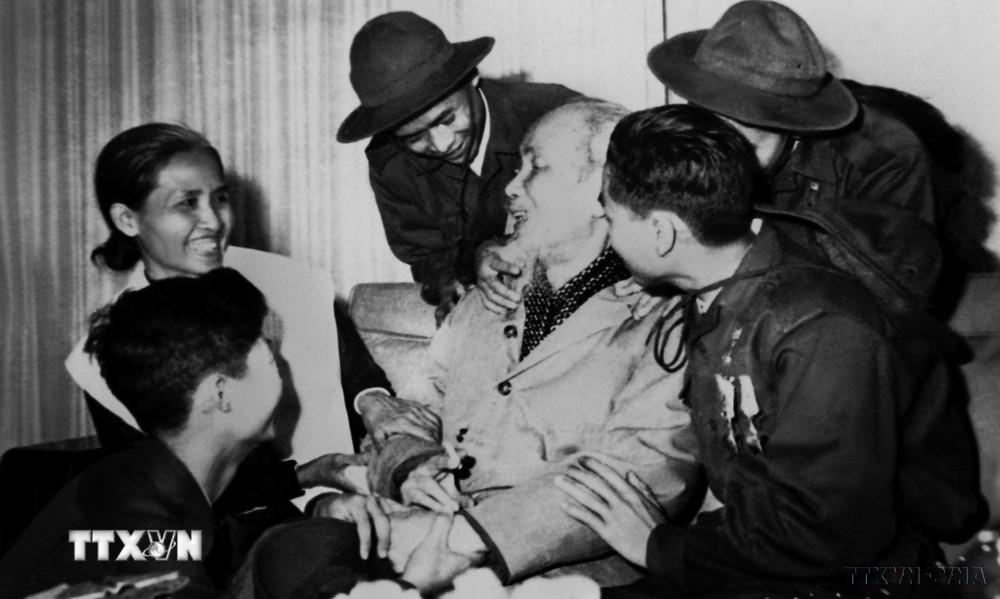
Prime Minister Pham Van Dong wrote: "Ho Chi Minh is tall but not far, new but not strange, great but not pretending to be great, shining but not overwhelming, meeting for the first time already feels close for a long time." It can be said that the simplicity and closeness of President Ho Chi Minh is rare in any leader in the world.
Uncle Ho's simplicity is very natural, not surreal but right in the hearts of the people, in the lives of the people, so everyone can learn and follow.
During his lifetime, Uncle Ho lived a simple life, from food, accommodation to the means used for daily work. His modesty and simplicity were praised by poet To Huu with creative and unique images in the poem "Uncle".
“Uncle leave love for us
A life of purity, no gold or silver
Fragile cloth, infinite soul
More than bronze statues exposed to the trails”
The more he loved the people and aspired to bring independence, freedom and happiness to the people, the more simple and frugal he was in his daily life.
Whether he was Van Ba, a kitchen assistant on the Admiral Latouche Tréville, the revolutionary Nguyen Ai Quoc during his years in Paris, France, or later a head of state living and working at the Presidential Palace in Hanoi, Ho Chi Minh was still a very simple and hard-working Ho Chi Minh.
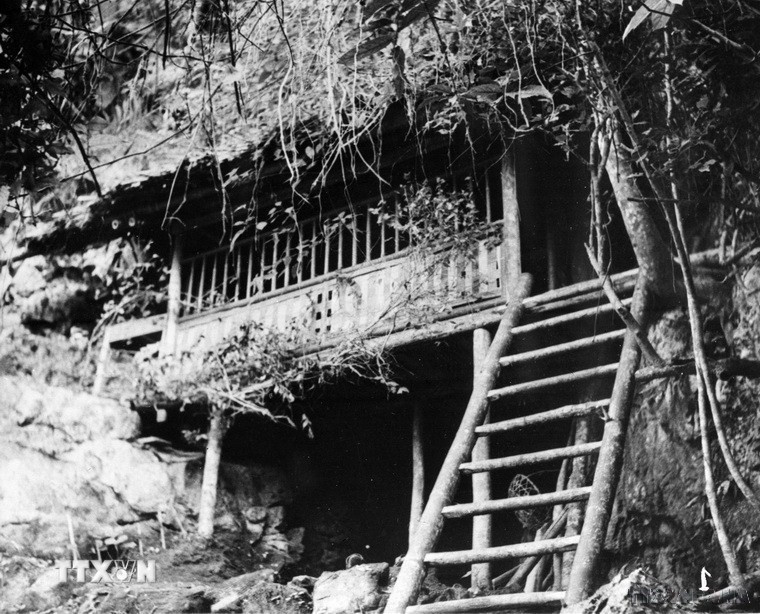
After 30 years of wandering abroad to find a way to save the country and save the people, returning to the Fatherland and directly leading the revolutionary movement, he lived in Pac Bo cave (Cao Bang) in difficult and deprived conditions but with a revolutionary optimism, as he himself wrote:
“Morning by the stream, evening in the cave
Bamboo shoot and vegetable porridge is ready
The shaky stone table of translating the Party's history
Revolutionary life is so noble”
(Pac Bo scene)
During the resistance war against the French colonialists (1945-1954), Uncle Ho and the Party Central Committee moved to Viet Bac to lead the resistance and national construction. His residence was just a small stilt house with a simple thatched roof.
Where on earth is there a leader in brown shirt and cloth pants who climbs mountains and wades through streams to go on campaigns; who washes his own clothes, holding a stick to dry them as he goes; who types his own documents, rides a horse to go on campaigns, exercises in the Viet Bac forests, teaches cadres martial arts...
Perhaps forever after, there will be few images that can touch people's hearts like that.
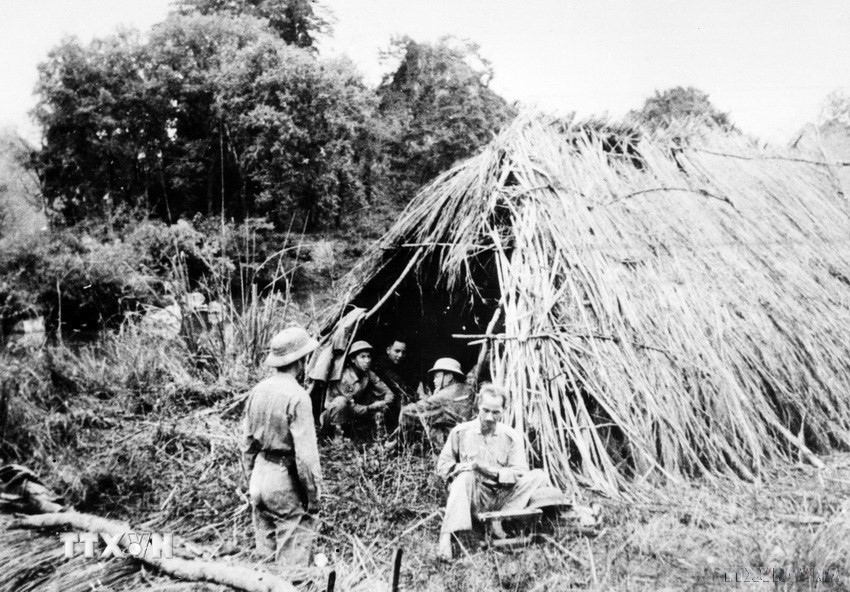
After the victory of the resistance war, returning to the capital Hanoi, President Ho Chi Minh did not stay in the old governor's house because he told himself that he was the President of a poor country and did not have the right to enjoy life. He decided to choose for himself the house of an electrician.
In 1958, the Central Committee decided to build a house for Uncle Ho, but he suggested that it should only be a small stilt house in the style of a house for ethnic minorities in Viet Bac, similar to the house he lived in during the resistance war.
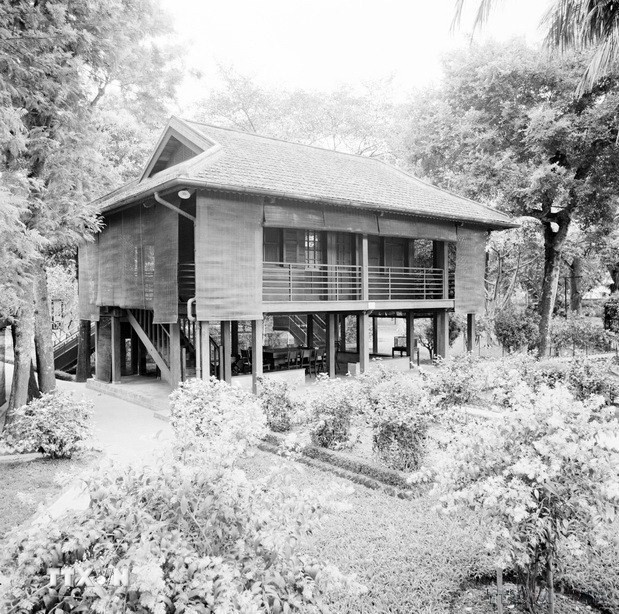
Feelings about the stilt house, Prime Minister Pham Van Dong once wrote: "Uncle Ho's simple stilt house only had a few rooms, while Uncle Ho's soul was filled with the wind of the times, that small house was always filled with wind and light, filled with the fragrance of garden flowers, such a life was so pure and elegant!".
The stilt house has two floors with three small rooms. The office on the first floor is where Uncle Ho often worked with the Politburo, met with leading officials to report on work, and where he warmly received a number of domestic and foreign delegations.
The upper floor had two small rooms, where Uncle Ho worked and rested. Each room was about 10 square meters wide, enough space to put a bed, a table, a chair, a wardrobe and a bookshelf; with very simple and plain furniture such as a single blanket, a woven mat, a palm fan and a typewriter.
After work, Uncle Ho often took care of the plants in the garden and the fish in the pond. In harmony with the natural landscape, Uncle Ho's stilt house at the Presidential Palace became very close and familiar to all Vietnamese people.
Today, the stilt house located in the President Ho Chi Minh Relic Site at the Presidential Palace has become a "red address," a place where the sentiments of the Vietnamese people and peace-loving people around the world converge.
No one who visits Uncle Ho's residence is not filled with feelings of respect and admiration for a great cultural personality who has become a legend in everyday life:
"Simple attic, a corner of the garden
Wood is usually rustic, no paint smell
Rattan bed, single blanket and pillow
Small closet, just enough to hang some worn shirts"
(Visiting Uncle Ho's old land - To Huu)
In daily life, from the most difficult years until he became President, Uncle Ho's meals only consisted of tomato sauce and pickles...
After meals, he himself neatly arranged the dishes on the table so that the waiters would have less trouble cleaning up. After eating, the bowl was always clean and the remaining food was neatly placed.
He said: "In life, everyone likes to eat well and dress well, but if that delicious food comes at the cost of other people's fatigue and trouble, then it shouldn't be."
“In life, everyone likes to eat well and dress well, but if that delicious food comes at the cost of other people's fatigue and trouble, then it's not right."
President Ho Chi Minh
Moreover, Uncle Ho always thought of everyone. When he had delicious food, he never ate it alone. He shared it with this person, then that person, and finally his own portion, which was usually the smallest.
Frugal and extremely simple, the President often wears a brown ao ba ba (traditional Vietnamese dress) and wooden clogs when working at home. When receiving guests or going on business trips, he often wears khaki clothes and rubber sandals.
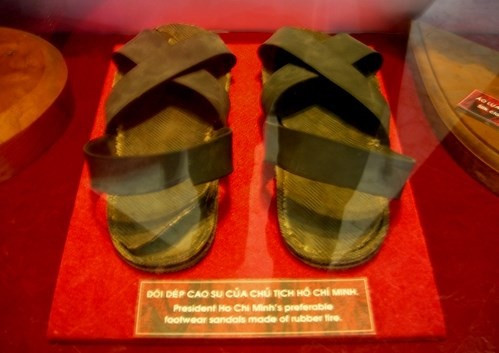
Once, Uncle Ho's shirt was torn and had to be patched over and over again, even the collar was replaced. But when people asked him to change into new clothes, he said: "What I wear is suitable for the people's and the country's circumstances, there is no need to change." "The country is still poor, the people's lives are still difficult, Uncle Ho already has two sets of khaki, although old but still in good condition, don't make more, it's a waste."
Speaking about President Ho Chi Minh's modesty, simplicity and sincerity, the late Chilean President Xanvado Agiende said: "Behind his gentle appearance was an indomitable, brave and indomitable spirit... At first, Westerners just laughed at his clothes, but then many people realized that his special clothes showed that no matter where he was, among the upper class or among the masses, he never forgot that he was a member of the masses of his beloved Vietnam... If anyone wants to find a word that can summarize the entire life of President Ho Chi Minh, it would be his extreme simplicity and extreme modesty."
Not only reflected in his lifestyle, President Ho Chi Minh's modesty and simplicity are also shown through his way of speaking, writing, and working.
Although he was a man of profound intelligence, fluent in many foreign languages, a talented politician, a sharp diplomat, a great writer and poet of the nation, when discussing, explaining or referring to political issues, he always presented things simply, without philosophy, long-windedness, clichés or books, turning complex things into easy-to-hear and easy-to-understand ones. Therefore, the truths: "Nothing is more precious than independence and freedom," "Vietnam is one..." have gradually permeated and entered the lives of the people.
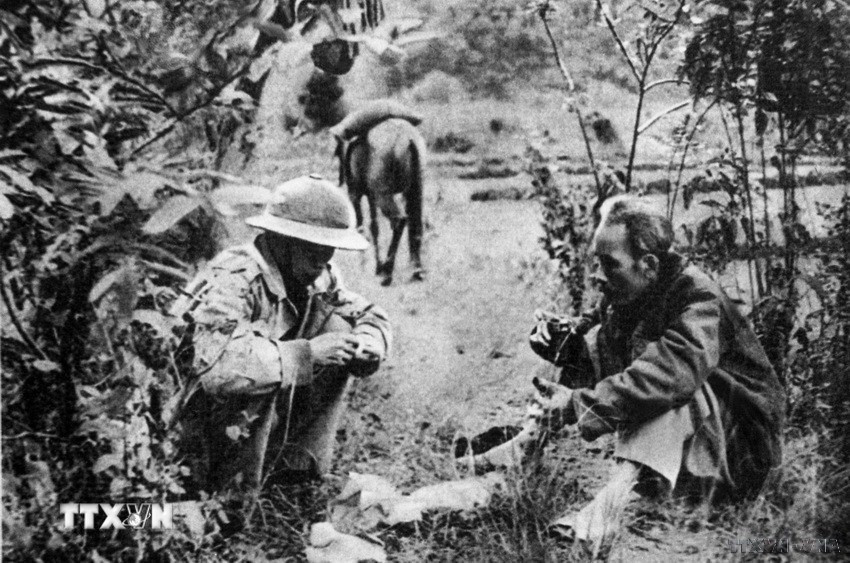
Although he was the supreme leader, when interacting with the people, his gestures and words were extremely simple and rustic. Even when he stood on the podium reading the Declaration of Independence at Ba Dinh Square, he stopped and asked: "Can you hear me clearly?" The whole sea of people that day shouted "clearly." There was no longer any distance between the leader and the people through his gestures.
Uncle Ho came to the soldiers on the front line, marched with them; Uncle Ho visited the accommodation, kitchens, and toilets of families and collectives; Uncle Ho went directly to the fields to work, instructing people about pests and diseases, about irrigation; Uncle Ho visited agencies, factories, enterprises, schools; Uncle Ho wrote letters to inquire about the elderly and children... Uncle Ho always proactively contacted and learned about the thoughts and aspirations of the people, thereby reaching the hearts of the people with a kind and sympathetic heart.
Wherever he went, Uncle Ho was simple, did not like grand receptions, did not like escorts, but immediately integrated with the masses, had direct and intimate dialogue with the masses, to grasp the real situation and sympathize with the thoughts and aspirations of the masses. There are few leaders whose image in the minds of the people is so close and simple. The entire Vietnamese people, from the elderly to the children, from generation to generation, call him with two affectionate names: Uncle Ho.
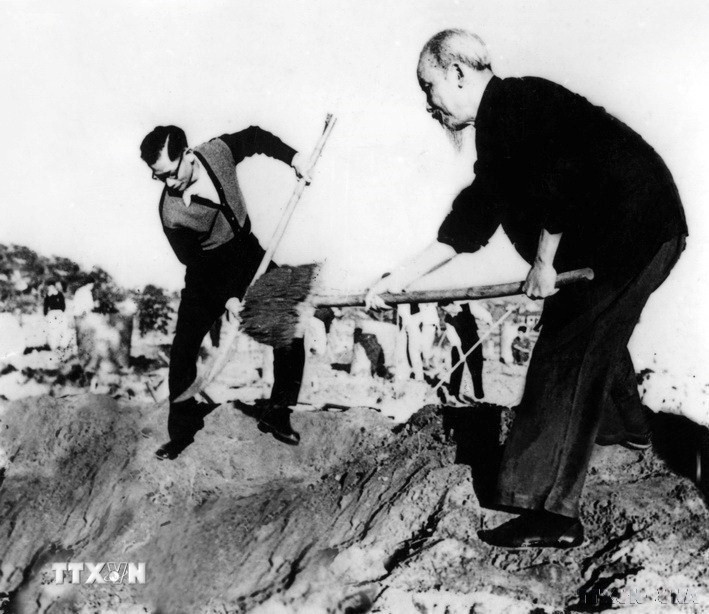
Uncle Ho's simple and noble lifestyle is both a cultural beauty and his cultural character, a shining example for all classes of people to follow.
Prime Minister Pham Van Dong wrote: “Do not misunderstand that Uncle Ho lived an austere life like a monk, or an elegant life like a hermit philosopher... A simple material life is more in harmony with a rich spiritual life, with the most beautiful thoughts, feelings, and spiritual values. That is the truly civilized life that Uncle Ho set a shining example for in today's world.
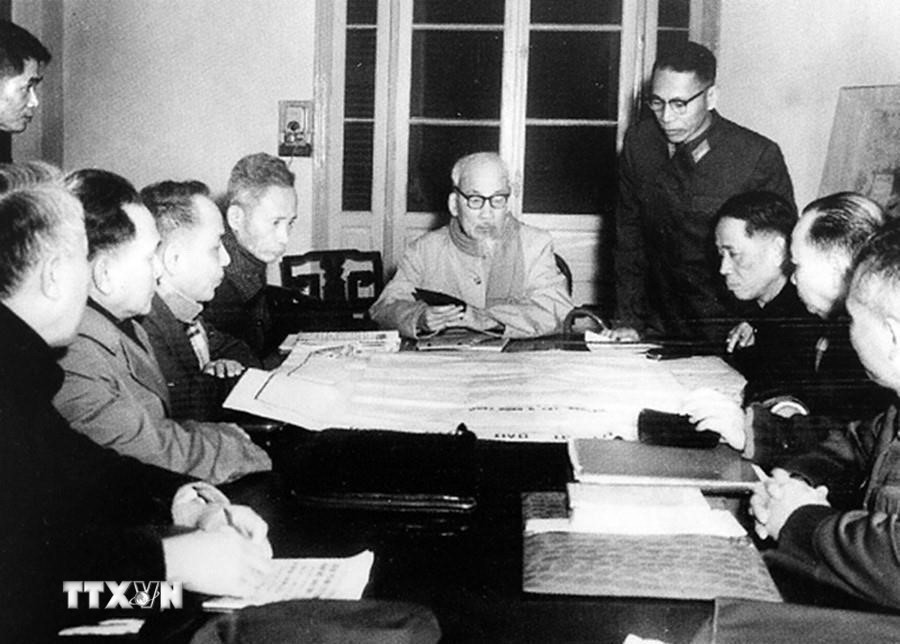
Throughout his life, he did not care about fame or profit, but only pursued a noble goal: "I have only one desire, an utmost desire, which is to make our country completely independent, our people completely free, everyone has food to eat, clothes to wear, and everyone can go to school."
That elegance is the essence of an Eastern sage, deeply imbued with Vietnamese identity and also shining with the spirit of Ho Chi Minh's wisdom. As a great friend of the people of all nations, Ho Chi Minh brought his sincerity and modesty, as well as his humane and humane delicacy to strengthen friendship, bring the world to Vietnam and bring the image of Vietnam to international friends.
Polish researcher Hélène Tourmaire, in her work "How to become an Uncle?" wrote: "In Ho Chi Minh, everyone sees the expression of the noblest, most ordinary and most beloved character in their family... The image of Ho Chi Minh is complete with the combination of Buddha's wisdom, God's charity, Marx's philosophy, Lenin's revolutionary genius and the affection of a family head, all wrapped up in a very natural appearance."
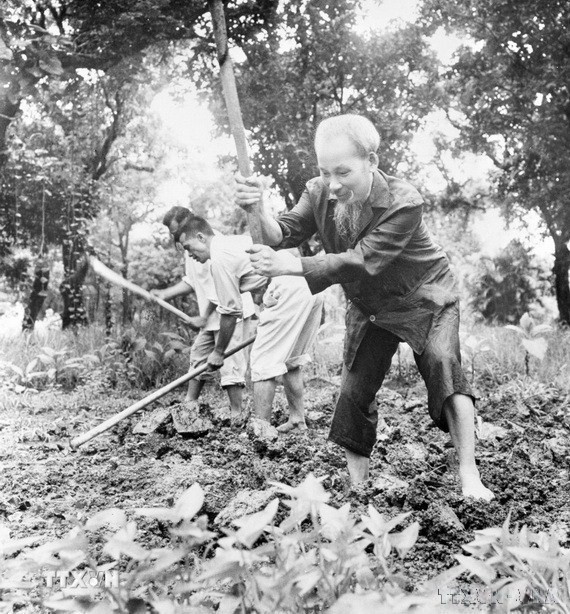
Is there any leader or great man in the world who lived and worked like our Uncle Ho? Many people from all over the country and the world have visited where Uncle Ho lived to understand a life, to feel a shining career - Ho Chi Minh.
So many people cried, from children to adults, from ordinary people to scholars, politicians, and generals everywhere - tears of respect and gratitude, of admiration and pride for Ho Chi Minh - the man who devoted himself to the struggle for the nation and humanity, to dedicate himself and sacrifice to the point of incarnating himself into the people.
When he breathed his last, there was not a single medal on his chest, because Ho Chi Minh was unfamiliar with nobility, because he did not care about fame and fortune, and because he was a wonderful, pure example of humility and altruistic compassion.
Therefore, for every Vietnamese person, studying and following Ho Chi Minh's ideology, morality and style is both a source of pride and a wish.
TN (according to VNA)